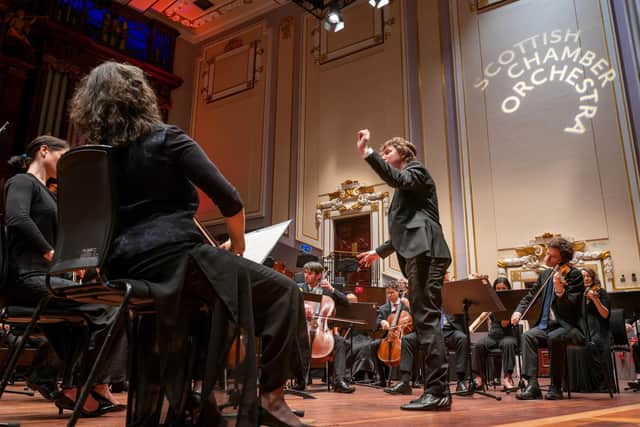Conductor Maxim Emelyanychev on the SCO's 50th Anniversary Season


You only live once, and life is beautiful. You need to enjoy it!” Not for Maxim Emelyanychev an existence of quiet contemplation, study and introspection (though he surely does a fair bit of all of those too). Anyone who’s seen the young Russian in his role as principal conductor of the Scottish Chamber Orchestra would hardly be surprised by his enthusiastic, smiling, go-getting attitude – even if he’s having to juggle increasingly prominent international appearances alongside his role with the SCO, and also directing period-instrument band Il Pomo d’Oro.
Emelyanychev is an undeniably electrifying, galvanising presence – for the SCO’s musicians as well as for its audiences. But all that energy and enthusiasm seem driven by a desire to convey his music as vividly and authentically as possible. It’s no wonder, then, that the SCO want him to stick around in Scotland for another five years: it’s just been announced that he’ll be continuing in his post until 2028. But we’ll come to that.
Advertisement
Hide AdAdvertisement
Hide AdEmelyanychev’s trademark enthusiasm began early in life. Rather astonishingly, he made his conducting debut at the age of just 12. There’s even a video online to prove it. But with an orchestral trumpeter for a father and a choral singer for a mother, he’d been immersed in music for as long as he can remember. “I was listening to orchestras almost every day when my father was playing. And he introduced me to a lot of the technical stuff too – he was always bringing home scores from the orchestra’s library, difficult things like Orff’s Carmina Burana.”
Most music-minded youngsters take up an instrument first, only contemplating conducting – if at all – much later. For Emelyanychev, unusually, it was the other way round. He’d decided he would conduct from his earliest years, and learnt keyboards (he regularly plays modern and period pianos, plus harpsichord, with the SCO) as a means of getting there. What was behind that early passion? “I just don’t remember now!” he laughs. “But in Russia’s intensive music training system, everyone starts to conduct early in their training – if you sing in a choir, you also learn how to conduct a choir, for example.” Intensive is the right description. “We had nine years in music school, then four years in college, five years in a conservatoire, and then more afterwards. Only a doctor’s training is harder.”
His start with the SCO, however, was hardly straightforward. His first appearance came entirely by chance, in 2018, as a last-minute stand-in for indisposed Robin Ticciati, in Schubert’s monumental “Great” C major Symphony. It went so well that the orchestra decided to release it as a CD – and to offer Emelyanychev a permanent role.
Almost as soon as he became principal conductor, however, Covid hit. But since then, he’s built what he feels are close connections with the SCO players – vital for a successful musical relationship, and immediately evident to audiences, too. It’s a small orchestra, which has helped in getting to know the players well. “And we do a lot of chamber music together, which helps in building closer relationships with the musicians,” Emelyanychev explains. “They’ve become friends. I trust them, and they trust me.”But a large part of that trust clearly comes from our earlier theme: authenticity. “I can just be myself with them, which is very important. When you’re conducting musicians, you shouldn’t need to play the role of being a conductor. That’s what happens sometimes with bigger symphony orchestras – you have to control the ways you act and speak very carefully, think about what you’re going to say, and how the players are going to react.”
There’s undoubtedly a disarming directness, almost a naivety to Emelyanychev’s way of expressing himself, whether that’s on the conducting podium or in talking in an interview. It’s tempting to see it as boyish eagerness, but it’s backed up by passion and seriousness. Emelyanychev’s English is good, but “not perfect” (his own description) – a situation he feels may actually aid communication with the SCO players. “A polite way might be to say, ‘Ladies and gentleman, could we please try to do this section differently?’ But I’d just say, ‘Louder! Softer!’” he chuckles. “It’s more direct, and it saves time too.”And it seems to get results – both musical and personal ones. Emelyanychev is about to close the SCO’s current season with Brahms’s luscious German Requiem – in name a mass for the dead, but in reality more of a warm hug for those left behind. Isn’t it something of an introspective choice for an end-of-season celebration? Emelyanychev questions that purpose. “I don’t really care about the end of the season – it’s just an idea. My season is never finished. We’ll be working in July and August, and we’ll be touring in Scotland.”


Then September means a new SCO concert season – a particularly special one, as 2023-24 marks the orchestra’s 50th anniversary. Emelyanychev kicks things off by taking the band back on the road, conducting Beethoven’s “Eroica” Symphony in six cities across Scotland alongside a brand new piece from Jay Capperauld, one of Scotland’s most exciting younger voices, and currently the SCO’s associate composer. “We wanted maximum variety for the new season,” Emelyanychev explains. There’s no shortage of that: later events include a return for his popular Baroque Inspirations concerts, which allow Emelyanychev to let his hair down as director and harpsichordist in music ancient and modern. There’s also a season-closing Mendelssohn Elijah, a Franco-Scottish concert with mezzo Karen Cargill, and what promises to be a surprised-filled concert marking the birthday itself in January 2024.
Talking of surprises, Emelyanychev has quite a few planned for his coming years with the orchestra – some of which peer critically at some fundamental musical questions. “We’re thinking about different shapes for the concerts – I think the classic overture-concerto-symphony structure will always exist, but we need to find different forms too. I always like to do interval music, for example – in the 18th century, Telemann even wrote a whole opera as interval entertainment!” Repertoire, too, is a specific focus for Emelyanychev’s future SCO projects. “I’d like to play more chamber music, and also bigger pieces by Tchaikovsky or Brahms, for example, that are now usually only played by bigger orchestras. We know that Liszt and Mendelssohn, for instance, used orchestras smaller than the SCO when they were working.”The SCO has long taken a refreshingly third-way approach to historical performance, neither sticking stubbornly to modern-day instruments, nor ditching them entirely in favour of instruments and techniques from earlier times. The result has been rich and clear, fleet-footed yet softer-edged than some more single-mindedly period-instrument bands. It’s something that Emelyanychev wants to develop, too – not least in suggesting that the SCO’s string players should swap from modern-day metal strings to the older gut variety. “We did a lot of gut-strings projects this year, for example, and not only Baroque music – we played Brahms and Mendelssohn with gut strings. But you need to schedule it carefully: most players have only one instrument, so to change from metal to gut takes time and patience. And it needs trust and understanding between the conductor and orchestra too.”
Advertisement
Hide AdAdvertisement
Hide AdThese are ambitious plans, but ideas that build on the SCO’s existing strengths and push them further. What was it, in the end, that convinced Emelyanychev to sign up for another five years with the orchestra? His answer is – perhaps predictably – disarmingly simple. “There’s a lot of music that we still want to play! And I can see so many possibilities with the musicians to achieve new things.” It’s going to be a busy, challenging, but hopefully fulfilling half-decade – and one in which Emelyanychev himself will no doubt grow increasingly busy with international commitments. How does he think he’ll cope? He laughs. “I’m used to it. It makes me feel like I’m alive.”
Maxim Emelyanychev concludes the Scottish Chamber Orchestra’s current season with Brahms’s German Requiem in Edinburgh, 11 May, and Glasgow, 12 May, see www.sco.org.uk. The Scotsman is the official media partner of the Scottish Chamber Orchestra’s 50th Anniversary Season.